espionage
Breaking: Hogue Commission Will Hear From New Safety-Protected Witnesses On PRC Targeting of Chinese Candidates
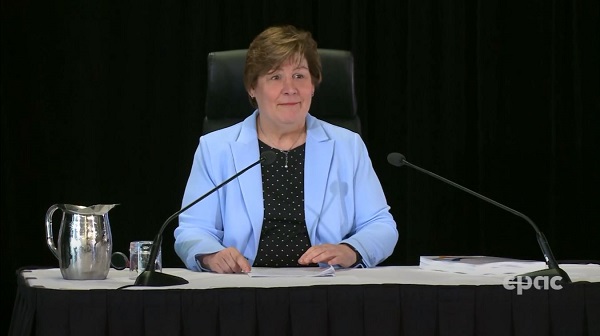
Hogue Finds Witnesses Face Credible Threats, Records Will Be Sealed for 99 Years
In an extraordinary move, Canada’s foreign interference inquiry will hear testimony from two new secret witnesses with firsthand knowledge of the People’s Republic of China’s influence operations targeting electoral candidates and community associations in Canada. Commissioner Marie-Josée Hogue announced the decision today, weeks after the public testimony phase concluded, revealing that the witnesses—identified only as Person B and Person C—face credible threats to their safety and that of their families due to their insights into how Beijing’s United Front Work Department (UFWD) targets Chinese Canadian politicians and community associations.
The witnesses’ identities and testimonies will be closely guarded, with only sanitized summaries made available to the public and participants. According to Hogue’s decision, Person B has provided critical insight into the UFWD’s tactics, describing how Beijing’s agents “co-opt and leverage some Chinese Canadian community associations and politicians of Chinese origin” to advance PRC interests. Much of Person B’s information is firsthand, Hogue’s decision states, suggesting the witness could produce explosive evidence relevant to high-profile cases under examination for Hogue’s final report in December.
Both witnesses expressed profound concerns about the consequences they could face if Beijing discovered their identities. Person C, in particular, described the likelihood of “threats to their physical safety, intimidation and harassment by PRC officials or sympathetic community members in Canada, and the potential loss of their employment” should their cooperation with the Commission become known. Person B similarly voiced fears of “serious repercussions,” including community ostracization and job loss, if their identity were disclosed. “This fear is based, in part, on the fact that the PRC and its United Front Work Department has infiltrated some Chinese Canadian community associations,” Hogue’s decision states.
In light of the witnesses’ statements and intelligence on PRC activities, Commission counsel deemed the witnesses’ concerns “credible.” Commissioner Hogue emphasized the necessity of these safety measures, stating, “I am satisfied by the information contained in the application that the fears expressed by Person B and Person C are not only credible, but also compelling. In light of other information that the Commission has received about the tactics of the PRC, including transnational repression, I am satisfied that the concerns expressed by Person B and Person C are reasonable.”
The extraordinary protective measures will allow the witnesses to provide their statements confidentially via affidavits, sealed for 99 years, marking an exceptional step to protect those revealing sensitive information on state actors. Commissioner Hogue further elaborated that the witnesses’ evidence is crucial to understanding the extent of Beijing’s operations in Canada but could not be accessed without protective guarantees.
Hogue’s decision marks a rare departure from standard inquiry practices, reflecting what she described as Canada’s duty to protect those who risk their safety to expose foreign influence.
Duff Conacher of Democracy Watch, which has made submissions seeking the disclosure of cabinet-protected documents in the Commission, said he welcomes the Inquiry’s decision to hear from important new witnesses.
“It’s good to see the Inquiry continue to gather evidence about foreign interference activities, especially given that its hearings in the spring and fall left many questions unanswered, mainly because the Inquiry called witnesses mostly from government and political parties who have an interest in covering up interference, loopholes, and weak enforcement,” he said.
But Conacher reiterated his reservations about the overall lack of transparency in the Commission’s proceedings and what he calls loopholes in Canada’s laws against foreign influence.
“The only way to stop foreign interference is to effectively prevent it, and it will only be prevented by closing huge loopholes in laws across Canada that allow for secret, undemocratic and unethical spending, fundraising, donations, loans, lobbying, and disinformation campaigns by foreign ‘proxies,’ and by strengthening enforcement and penalties,” he said. “Hopefully, the Hogue Inquiry will strongly recommend closing all these loopholes and strengthening enforcement and penalties.”
The Bureau is a reader-supported publication. To receive new posts and support my work, consider becoming a free or paid subscriber.
espionage
PEI to Ottawa: Investigate CCP Footprints—Now
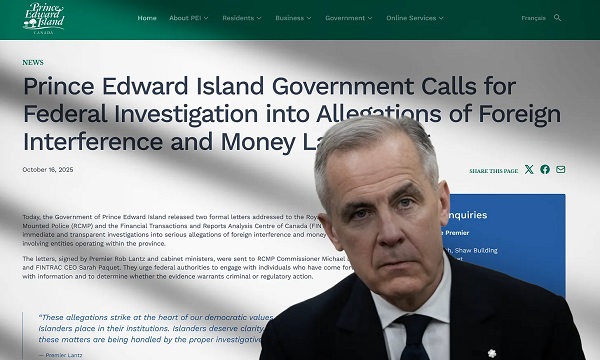
A tiny province just did what the federal government refuses to: demand answers about foreign interference and Chinese money.
Prince Edward Island’s new government just lit a signal fire Ottawa can’t ignore—two formal letters demanding immediate, transparent federal investigations into alleged foreign interference and money laundering on the Island. One to RCMP Commissioner Michael Duheme, the other to FINTRAC CEO Sarah Paquet. Clear, direct, no hedging: talk to the whistleblowers, follow the money, and determine whether criminal or regulatory action is warranted.
And here’s the part that should make every sane person furious: why did it take a new government to do the obvious? Where was this urgency from the last crew running Charlottetown? For years, Islanders were told to calm down, look away, don’t ask questions—and now, in week one of grown-up supervision, we suddenly discover the tools were always there. Why didn’t the previous government pull them?
Even worse, why hasn’t the Liberal establishment in Ottawa barley lifted a finger in regards to foreign interference in this country? This is the same crowd that held a public inquiry into foreign interference, took victory laps, and then… parked the file. The commission issued volumes of findings and 50-plus recommendations, but action? Mostly press releases. Meanwhile, the much-hyped foreign influence registry —passed on paper in 2024— still isn’t fully in force, with cabinet dithering while everyone pretends it’s complicated. If the smallest province can move in days, what’s Ottawa’s excuse after years of warnings and a law they already passed?
Premier Rob Lantz framed it plainly: Islanders deserve clarity and competent, depoliticized scrutiny. The province says the move follows years of speculation and a Parliament Hill press conference on Oct. 8 where a former RCMP superintendent suggested evidence could justify a criminal probe centered on PEI. Translation: this is no longer a fringe concern—it’s now an official paper trail with the RCMP and FINTRAC on the hook.
PEI also reminded Ottawa that in February 2025 it ordered the Island Regulatory and Appeals Commission (IRAC) to run an independent land-ownership investigation—with new powers added to the Lands Protection Act in 2022—amid public questions about complex land purchases and potential indirect control. That review is ongoing and now sits alongside the requested federal probes.
Context matters: investigative reporting in recent weeks connected these concerns to Buddhist-affiliated networks and called for a wider federal inquiry. Whether every allegation holds or not, PEI’s letters escalate the file from media claims to formal federal scrutiny—exactly where it belongs if Canada is serious about foreign interference.
Bottom line: a tiny province—Prince Edward Island of all places—just forced a national reckoning. Not Toronto, not Ottawa, not some vaunted federal intelligence agency. No, it took 160,000 salt-of-the-earth Islanders to do what the entire Liberal Party has refused to do for years: demand an investigation into what looks suspiciously like CCP-linked land grabs, money laundering, and political influence operations happening right under our noses.
And yet—silence from Ottawa. Why? Because could it be that the same people now running the show in this country are the ones who spent the last decade cheerleading for the Chinese Communist Party? Mark Carney, has a track record with China that reads like a LinkedIn endorsement from the People’s Liberation Army. Brookfield, where Carney was Vice Chair, took $250 million from the Bank of China to fund its real estate empire. You think that doesn’t come with strings? Please.
And Trudeau? Let’s not forget, this is the man who once said he admired China’s “basic dictatorship”—because, of course he did. That kind of centralized control makes things so efficient when you’re trying to crush dissent and funnel wealth into the hands of a compliant elite.
The ball is in the RCMP and FINTRAC’s court. But if you’re expecting urgency from institutions shackled to the same political class that let this rot take hold, don’t hold your breath. PEI just did the hard part. Now we get to find out if Canada has any real institutions left.
Subscribe to The Opposition with Dan Knight
espionage
Breaking: P.E.I. Urges RCMP Probe of Alleged Foreign Interference, Money Laundering

The Great Enlightment Buddhist Academy, PEI
Prince Edward Island’s government has formally asked the RCMP to investigate allegations of foreign interference and money laundering tied to Buddhist-affiliated organizations operating in the province — an escalation that follows The Bureau’s reporting and last week’s press conference on Parliament Hill calling for a federal public inquiry.
In a letter sent today to RCMP Commissioner Michael Duheme, Premier Rob Lantz and Minister of Housing Cory Deagle urge federal authorities to “review any evidence available, engage with the individuals who have made these claims, and conduct an investigation into any wrongdoing.” A companion letter was sent to FINTRAC, asking Canada’s financial intelligence unit to assess whether regulatory action is warranted.
The government move comes a week after The Bureau reported on findings presented at an October 8 news conference tied to the book Canada Under Siege: How P.E.I. Became a Forward Operating Base for the Chinese Communist Party.
In a following op-ed, co-author Garry Clement said the press conference had “set down a marker: Canada has entered a new era of contestation — over influence, sovereignty, and the integrity of its democratic institutions.” In related coverage by CBC, representatives of the religious groups have denied any links to the Chinese Communist Party or any improper dealings.
Clement and co-authors argued that the allegations demand “action, reform, and reckoning,” and called for a federal public inquiry with full powers — an appeal joined by former Solicitor General and long-time P.E.I. MP Wayne Easter, who urged an inquiry capable of compelling testimony and documents.
The Bureau also revealed a development that stunned Islanders: a response subpoenaed by P.E.I. lawmakers showed that an anticipated 2016–2018 Island Regulatory and Appeals Commission (IRAC) investigation into Buddhist-linked land holdings was never completed. A January 26, 2018 letter from IRAC’s appointed counsel notified firms representing the groups that the section 15 probe “has ended,” without public findings or any explanation of who ordered the closure or why. The disclosure raised fresh questions about oversight and potential conflicts, and now forms part of the backdrop to the province’s formal request for federal action.
The Bureau contacted IRAC last week with questions related to the agency’s management, including counsel relationships and prior positions within P.E.I. legal networks. New developments on this breaking story will be reported.
Today’s letter to RCMP Commissioner Duheme from the P.E.I. government explicitly references the October 8 statements by a former Solicitor General of Canada and a former RCMP Superintendent, noting it was “suggested that information exists that could provide grounds for a criminal investigation.” The Premier further flags assertions that P.E.I. has been used as “a forward operating base for the Chinese Communist Party,” calling the claim “serious” and stating it must be examined by federal agencies to determine whether any factual basis exists.
The province also points to what it describes as a newly mandated and ongoing investigation by IRAC into land holdings “associated with some of the same entities referenced in the public allegations,” using powers expanded in 2022 under the Lands Protection Act. Any findings with criminal or national-security implications, the letter says, will be referred to federal authorities.
The Bureau is a reader-supported publication.
To receive new posts and support my work, consider becoming a free or paid subscriber.
-

 Red Deer19 hours ago
Red Deer19 hours agoThe City of Red Deer’s Financial Troubles: Here Are The Candidates I Am Voting For And Why.
-

 Business1 day ago
Business1 day agoCutting Red Tape Could Help Solve Canada’s Doctor Crisis
-

 espionage22 hours ago
espionage22 hours agoPEI to Ottawa: Investigate CCP Footprints—Now
-

 Alberta2 days ago
Alberta2 days agoAlberta taxpayers should know how much their municipal governments spend
-
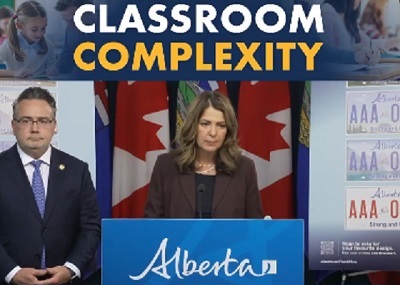
 Alberta2 days ago
Alberta2 days agoPremier Smith addresses the most important issue facing Alberta teachers: Classroom Complexity
-
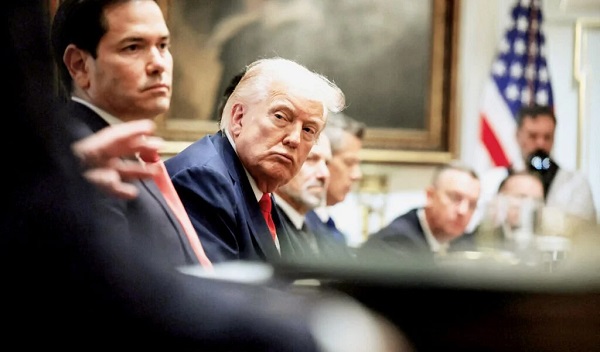
 Bruce Dowbiggin1 day ago
Bruce Dowbiggin1 day agoBrokeback President: We Can’t Quit You, Donald
-
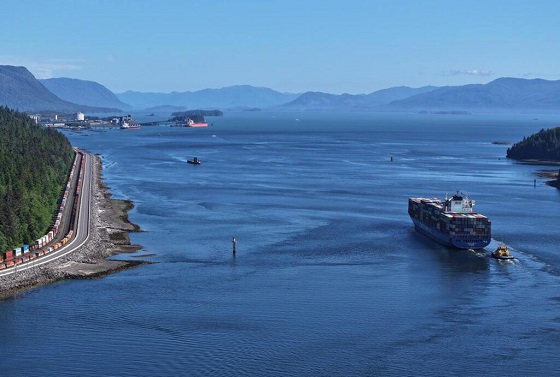
 Energy1 day ago
Energy1 day agoPrince Rupert as the Optimal Destination Port for an Alberta Crude Oil Pipeline –
-
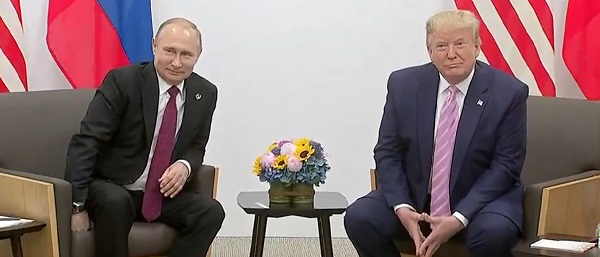
 Daily Caller1 day ago
Daily Caller1 day agoTrump, Putin Agree On High-Stakes Meetings To Negotiate End To Ukraine War









